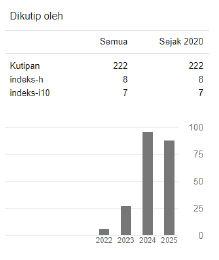The Nature of Humanity in the Quran: Perspective of Islamic Educational Philosophy
 https://doi.org/10.54012/ijcer.v3i3.472
https://doi.org/10.54012/ijcer.v3i3.472
 Abstract views: 160
Abstract views: 160
 PDF downloads: 145
PDF downloads: 145
Keywords:
Al-Quran, Philosophy, HumanAbstract
The nature of humans in the concept of Islamic education is a creature created by Allah SWT who can develop all the potential they have as well as possible without neglecting anything at all. The basic potential of human nature must be designed optimally and integrated through a lifelong education process. The research method used in obtaining data in this article is qualitative research with libraries, which takes data from the literature used to search for concepts, theories, opinions, or discoveries that are closely related to the main problem of this research. Based on the explanation in the discussion section, it can be concluded: (1) the terms used in the Qur'an in referring to humans are al-Insan (referring to humans who have special qualities and potential), al-Basyar (referring to humans as biological creatures), and al-Nas (referring to humans as social creatures); (2) The views of the figures on the nature of humans differ but the essence is the same, namely humans as creatures who have different potential from other creatures of Allah; (3) Humans are referred to as ahsan al-taqwin which places humans in a strategic position, namely as servants of Allah and as caliphs of Allah
Downloads
References
Ramayulis. Ilmu Pendidikan Islam. Kalam Mulia. Jakarta: Kalam
Izutsu, T. Ethico Religious Concepts in the Qur’an. Kanada: McGill Queen’s University Press., 2002.
Kholil, A. “Manusia Di Muka Cermin Ibn.Arabi (Memahami Hakikat Manusia Dengan Kacamata.Ibn Arabi).” Jurnal "el-Harakah 8, no. 3 (2006).
Prayitno. Teori Dasar Dan Praksis Pendidikan. Jakarta: Kompas Gramedia., 2009.
Hermawan, H. Filsafat Pendidikan Islam. Jakarta: Direktorat Jenderal Pendidikan Islam Kementerian Agama, 2012.
Basri, Hasan. Filsafat Pendidikan Islam. Bandung: Pustaka Setia, 2009.
Suharto, Toto. Filsafat Pendidikan Islam. Yogyakarta: Ar Ruzz, 2006.
Aziz, Mursal dan Zulkipli Nasution. Al-Qur’an: Sumber Wawasan Pendidikan Dan Sains Teknologi. Medan: Widya Puspita., 2019.
Aziz, A. “Hakikat Manusia Dan Potensi Ruhaninya Dalam Pendidikan Islam: Sebuah Kajian Ontology.” Ta’allum: Jurnal Pendidikan Islam, 1, no. 3 (2013).
Siregar, E. “Hakikat Manusia (Tela’ah Istilah Manusia Versi Al-Qur’an Dalam Perspektif Filsafat Pendidikan Islam).” Majalah Ilmu Pengetahuan Dan Pemikiran Keagamaan Tajdid, 2017.
Fuadi. “Eran Akal Menurut Pandangan Al-Ghazali.” Jurnal Substantia, 1, no. 12 (2013).
Nuryamin. “Kedudukan Manusia Di Dunia (Perspektif Filsafat Pendidikan Islam).” Jurnal Al-Ta’dib 10, no. 1 (2017).
Rahman, F. Major Themes of the Qur’an. London: The University of Chicago Press, 2009.
Islamiyah. “Manusi Dalam Perspektif Al-Qur’an (Studi Terminologi Al-Basyar, Al-Insan Dan Al-Nas).” Aspek Pemikiran Islam, 1, no. 1 (2020).
Syafei, I. “Hakikat Manusia Menurut Islam.” Psympathic : Jurnal Ilmiah Psikologi, 6, no. 1 (2013).
Rakhmat, J. Islam Dan Pluralisme: Akhlak Quran Menyikapi Perbedaan. Jakarta: Serambi Ilmu, 2006.
Khobir, A. “Hakikat Manusia Dan Implikasinya Dalam Proses Pendidikan (Tinjauan Filsafat Pendidikan Islam).” Forum Tarbiyah, 8, no. 1 (2010).
Alim, A. S. “Hakikat Manusia, Alam Semesta, Dan Masyarakat Dalam Konteks Pendidikan Islam.” Jurnal Penelitian Keislaman 15, no. 2 (2019).
Badaruddin, K. Filsafat Pendidikan Islam (Analisis Pemikiran Prof. Dr. Syed Muhammad Al-Naquib Al-Attas). Yogyakarta: Pustaka pelajar, 2009.
Susanto. Pemikiran Pendidikan Islam. Jakarta: Sinar Grafika Offset, 2009.
Mulia, 2008. Sadulloh, U. Pengantar Filsafat Pendidikan. Bandung: Alfabeta, 2009.
Susanti, S. E. “Epistemologi Manusia Sebagai Khalifah Di Alam Semesta.”Humanistika 6, no. 1 (2020).
Afrida. “Hakikat Manusia Dalam Perspektif Al-Qur`an.” Jurnal Kajian Ilmu-Ilmu Hukum, 16, no. 2 (2018).
Leaman, O. A Brief Introduction to Islamic Philosophy. Cambrigde: polity press, 1999.
Downloads
Published
How to Cite
Issue
Section
License
Copyright (c) 2025 Dellawati, Sunarto

This work is licensed under a Creative Commons Attribution-ShareAlike 4.0 International License.









